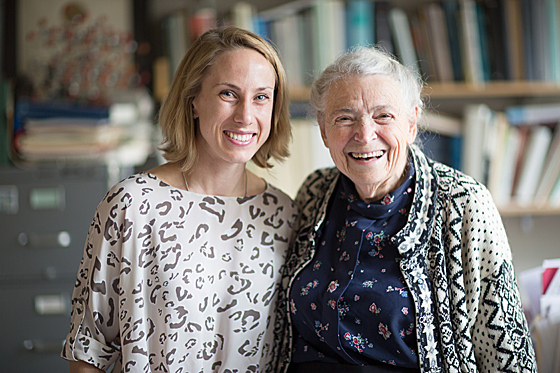When Mildred S. Dresselhaus was awarded a $1 million Kavli Prize last year, the Institute Professor Emerita of Physics and Computer Science and Engineering decided to invest her prize money in an institution she knows quite well: MIT.
During a career spanning more than five decades at the Institute and Lincoln Laboratory, Dresselhaus has helped usher in the age of nanotechnology with her research on the fundamental properties of carbon. By establishing the Mildred S. Dresselhaus Fund to support women or junior members of the faculty, she hopes to shape its future as well. Saying that her Kavli prize “happened because of the investment MIT made in me many years ago through the generosity of others,” Dresselhaus established the fund “because this was the best investment I could think of for this money.”

From left: Polina Anikeeva and Mildred S. Dresselhaus Photo: Bryce Vickmark
The inaugural recipient of the Dresselhaus Award will be Polina Anikeeva, the AMAX Career Development Assistant Professor in Materials Science and Engineering. Anikeeva’s research focuses on bridging the gap between existing approaches to the treatment of neurological and neuromuscular disorders by developing materials and devices for neural prosthetics. Currently, treatments are either based on drugs with undesirable side effects and limited terms of effectiveness, or on mechanically invasive and outdated electronic devices.
“Millie encompasses the spirit of MIT in terms of innovation and fearlessness,” Anikeeva says of the former member of her thesis committee. She recalls that Dresselhaus pushed her hard on the standards for her work, and that she read her dissertation closely enough “to fix all of my spelling errors.” More importantly, Anikeeva adds, “Millie’s support has made me a better scientist.”
Anikeeva notes that the award will allow her to “pursue things that may not be necessarily easy to support with traditional resources.” In a field where faculty are often pushed to build more practical devices, having a pure research award will give her the freedom, time and funding to think about “the more physical and fundamental principles behind what we’re designing.”
During a career spanning more than five decades at the Institute and Lincoln Laboratory, Dresselhaus has helped usher in the age of nanotechnology with her research on the fundamental properties of carbon. By establishing the Mildred S. Dresselhaus Fund to support women or junior members of the faculty, she hopes to shape its future as well. Saying that her Kavli prize “happened because of the investment MIT made in me many years ago through the generosity of others,” Dresselhaus established the fund “because this was the best investment I could think of for this money.”

From left: Polina Anikeeva and Mildred S. Dresselhaus Photo: Bryce Vickmark
The inaugural recipient of the Dresselhaus Award will be Polina Anikeeva, the AMAX Career Development Assistant Professor in Materials Science and Engineering. Anikeeva’s research focuses on bridging the gap between existing approaches to the treatment of neurological and neuromuscular disorders by developing materials and devices for neural prosthetics. Currently, treatments are either based on drugs with undesirable side effects and limited terms of effectiveness, or on mechanically invasive and outdated electronic devices.
“Millie encompasses the spirit of MIT in terms of innovation and fearlessness,” Anikeeva says of the former member of her thesis committee. She recalls that Dresselhaus pushed her hard on the standards for her work, and that she read her dissertation closely enough “to fix all of my spelling errors.” More importantly, Anikeeva adds, “Millie’s support has made me a better scientist.”
Anikeeva notes that the award will allow her to “pursue things that may not be necessarily easy to support with traditional resources.” In a field where faculty are often pushed to build more practical devices, having a pure research award will give her the freedom, time and funding to think about “the more physical and fundamental principles behind what we’re designing.”






